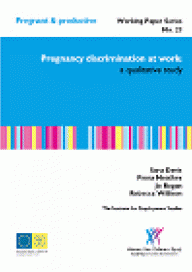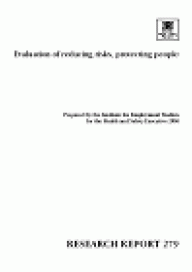Publications
 We author and publish a range of resources to keep you up to date with the latest developments in employment, labour market and human resource policy and practice.
We author and publish a range of resources to keep you up to date with the latest developments in employment, labour market and human resource policy and practice.
All our pdf publications are free to access.
Search results
-
📄
Employee Assistance Programmes
Newton L, Hayday S, Barkworth R | Mar 2005 | Institute for Employment StudiesThis paper identifies why organisations chose to offer Employee Assistance Programmes (EAPs), as well as what provision is available, and how organisations decide on a certain provider and service. It looks at how effectively organisations monitor employee usage and satisfaction. The paper guides employers in what to bear in mind when considering providing an EAP, as well as suggestions for evaluating existing EAPs.
-
📄
Stress Audits
What you Need to Know
Newton L, Hayday S, Silverman M | Mar 2005 | Institute for Employment StudiesThis review addresses current issues involved in measuring workplace stress. It begins by discussing what a stress audit is and what information it produces. Other issues, such as the validity and reliability of stress audits, the potential benefits and pitfalls of assessing stress, what products are available, the implications of conducting stress audits and what next steps to take after conducting one, are also addressed.
-

What Makes a Good Employer?
Rafferty AM, Maben J, West E, Robinson D | Feb 2005 | International Council of NursesThis document summarises underlying evidence and issues related to good human resource management in the health sector with reference to: indicators of performance and measurement of nursing outcomes; performance issues related to individuals and teams; and employee engagement, commitment and organisational citizenship behaviour.
-

Pregnancy Discrimination at Work
A Qualitative Study
Davis S, Neathey F, Regan J, Willison R | Jan 2005 | Equal Opportunities CommissionThe findings of this study into pregnancy-related discrimination illustrate the breadth of issues that come up during working women's pregnancies and the common threads of their experience, in spite of different backgrounds.
-
📄
Pregnant Employees
Good Employer Practice
Robinson D, Newton L | Jan 2005 | Institute for Employment StudiesThis paper aims to: provide recommendations on the basis of current research; highlight the implications for employers; provide a summary of good practice for managing pregnant employees; and give details of how employers can avoid unintentional discrimination.
-

Evaluation of Reducing Risks, Protecting People
Rick J | Oct 2004 | Health and Safety ExecutiveReducing Risks, Protecting People (R2P2) is the document that explains the basis for the Health and Safety Executive's (HSE's) decision-making processes. As such it underpins all HSE regulatory activity. The research summarised here sought to establish the reach of the document amongst the HSE's stakeholder groups and to determine the extent to which R2P2 makes HSE activities transparent and lays the decision making process open to scrutiny.
-
📄
Managers as Developers of Others - A Practical Framework for Managers
Hirsh W, Silverman M, Tamkin P, Jackson C | Sep 2004 | Institute for Employment StudiesThis paper outlines how managers can improve their effectiveness in developing others, and covers setting the climate, building a developmental relationship, feedback and focus, delivering development and active career development. It also demonstrates how these elements relate to each other. The paper outlines what managers should not do when developing others.
-
📄
Managers as Developers of Others - Main Findings of an IES Research Study
Hirsh W, Silverman M, Tamkin P, Jackson C | Aug 2004 | Institute for Employment StudiesThis paper is based on a study by IES that investigated the behaviour of managers who are good at developing other people in the workplace. This paper contains: characteristics of good and bad development support; situations where good developers make a difference; what motivates good developers of others; enablers and barriers to developign others; the impact of good and bad development support; a framework for managers as developers; some practical suggestions for managers; and information about the research.
-
📄
Promoting a Healthy Workforce
Hayday S | Jul 2004 | Institute for Employment StudiesWorkplace health promotion is a subject with which HR professionals are finding themselves involved more frequently these days. It has often been seen as the exclusive preserve of occupational health professionals, but with increasing concern over sickness absence and stress problems among employees, it is an area in which HR staff now need to have more than a passing knowledge.
-
📄
Managers as Developers of Others
Hirsh W, Silverman M, Tamkin P, Jackson C | Mar 2004 | Institute for Employment StudiesOrganisations are now placing heavy emphasis on the role of the manager as coach, and on the workplace as a learning environment. This report contains a literature review of ideas about managers as developers of others, presents the IES research findings, including a framework for managers, and relates some of the narrative accounts collected.
